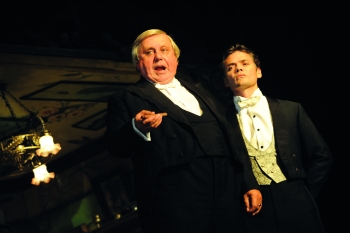Learning to ‘face a few responsibilites’
Working with a student the other day, I realised that writing about the character of Mr Birling in ‘An Inspector Calls’ is probably the most difficult. When teachers who have taught AIC for years tell me it is ‘too clumsy’, ‘too obvious’, ‘too preachy’, they are referring in part to Arthur Birling and I can see what they mean. He is, like all characters, a construct and is designed to deliver Priestley’s message. But as a construct he is almost ‘clunky’.
However, we have to remember where our students are coming from.
On the whole, they have a very limited experience of politics. For them, in their naivety, Birling proves to be a powerful symbol of capitalism. His abuse of power is something they may only just be beginning to grasp. Priestley’s characterisation is an eye-opener to them. He teaches them that we may have been brainwashed into believing that profit is everything. That prosperity doesn’t necessarily encompass the welfare and rights of those less privileged.
Birling is a construct. But if we consider an audience who were just beginning to realise that a welfare state, an NHS, a state pension were real possibilities, he becomes a sophisticated messenger for a better society. Some of the most obvious statements students can make incorporate highly complex ideas about society, politics and context.
Areas to consider further:
- Birling is effectively willing to ‘sell’ his daughter in order form an alliance with the Crofts. He says, ‘your engagement to Sheila means a tremendous lot to me. She’ll make you happy, and I’m sure you’ll make her happy.’ This statement suggests that this is all about Birling and Gerald being happy. Sheila is something of an afterthought. His attitude to his daughter is archaic and patriarchal: she is simply a convenient route to more power and wealth.
- Birling is happy to exploit the workers and in particular vulnerable female workers. He embodies the attitudes of the rich who believe that it’s their ‘duty to keep labour costs down’. For example, he is unable to imagine their hardship or the consequences of his obsession with profits: his is the lack of compassion and empathy which Priestley, as a socialist, believes underpins capitalism.
- He is presented as a buffoon – his ironic prophecies about the future – the ‘unsinkable’ Titanic and ‘Nobody wants war’ are blatantly wrong. He is indeed constructed as a figure we despise and ridicule but for a reason. Just as the Inspector is the mouthpiece for all that Priestley holds true, so Birling is the mouthpiece for everything Priestley objects to.
- Birling’s fear of scandal and desperate need to protect his reputation can enable students to understand a time when appearances were everything and hypocrisy was rife. His longing for a knighthood reveals his deep insecurity about his middle-class status and his desperation to somehow become more equal to his wife and to the Crofts.
For all that we can criticise Arthur Birling as an obvious construct, he remains a character who can teach the younger generation a lot about what not to believe in and how not to treat others. What is obvious to an older generation is often fresh and fascinating to a younger one: everybody does have to look after everybody else if we are to get the best out of society.
Useful Vocabulary: you could use these words to explore character, context and events:
capitalist self-centred aspirational insecure reputation scandal patriarchal archaic exploitative uncompassionate hard-headed self-interested blustering obstructive bigoted buffoon misguided opinionated domineering
Further support for An Inspector Calls

Oxford Literature Companion study guide and student-friendly write-in workbook are ideal for use in the classroom or as revision at home. They include activities designed to prompt a closer analysis of the writer’s language, as well as tasks on characters, themes and contexts.

Helpful insights – thank you.